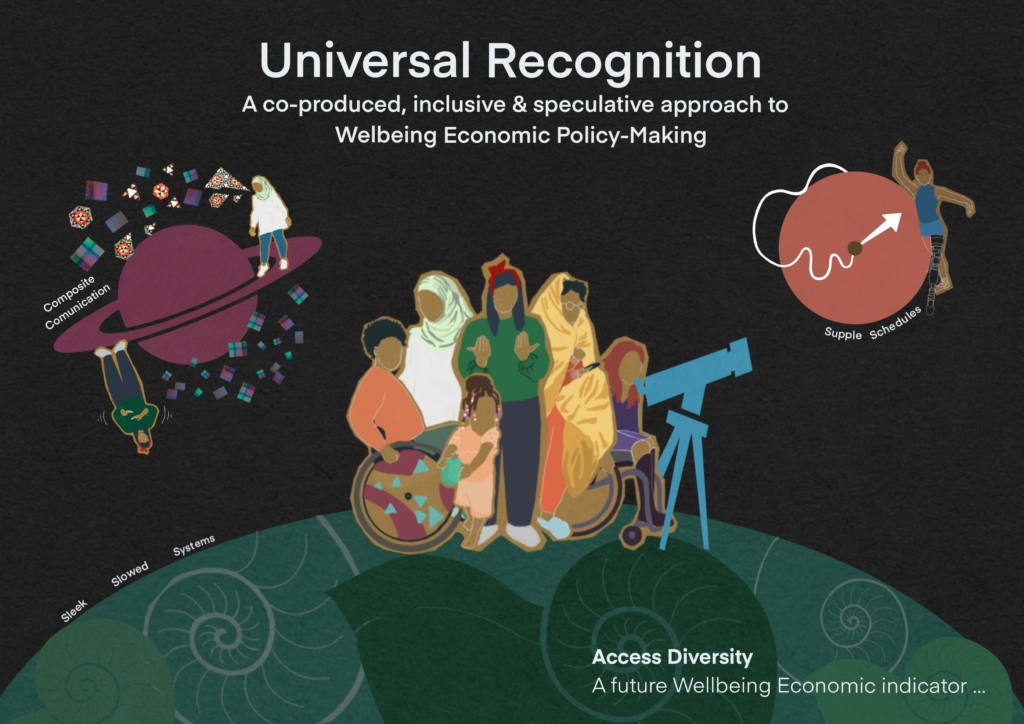Rebecca Lee (She/her)

Civic Design Consultant working across sectors and ‘in the real world’. Ensuring that everyday know-how can nourish better tomorrows. Innovative and inclusive story telling – shared, heard, seen & felt.
How I Go About Things
My practice is Disability led and informed by the Social Model of Disability, Design Justice and Co-production. I love making sense of it all by making it all together.
Why I Go About Things the Way I Do
I am an invisibly Disabled designer. I have a parent who is profoundly hard of hearing and I was an unpaid carer to my other terminally ill parent until their passing in 2019. My family and I have long navigated a world that is not designed with us in mind. A world that doesn’t value our way of being or cherish our joy especially at the end of life when we are no longer deemed useful or ‘productive’. I have come to understand through our experience that design is political – systems, policies, objects and environments are made. They can be made to include or they can be made to exclude. They can be wonderful and welcoming to people and planet. Equally they can deny our diverse planetary reality and very existence. Folks can make things this way on purpose or they can make them this way without any thought – How we attend to the making as makers is important. Systems, environments and objects can be all the poorer and brittle because of who they disenfranchise. Making processes can alternatively be more elastic and resilient due to the life they embrace. I try to spend my time, practicing as best I can, the latter approach to making made things.
My studio values the lives of folks living in the margins. Connecting marginalised folks with opportunities they are not typically afforded and creating equity through design is what my work focuses on.
Working Together
I work with and platform communities, people and professionals with marginalised experiences within design research and policy-making. Together we plant the seeds of civic and professional collaborations that can afford us more accessible and sustainable futures. I am taking a punt that we will grow better tomorrows if we collaborate from our shared sofas, kitchen tables and community centres today.
GSA – Master Design Innovation & Citizenship Passing with Distinction. Civic Trust Regional Finalist 2021 and Arts Fund’s Museum of the Year Finalist 2022 within the Story Museum Oxford; Rebecca Lee Studio Small Worlds.
Getting to Know You
Open to consultation commissions from October 2022 onwards, availability depending. Looking forward to meeting you, your community or organisation and better understanding your story.
Contact
Works

Universal Recognition
How diverse perspectives within policy making can seed Wellbeing Economic Worlds fit for us all.
Why Innovate?
“It matters what stories make worlds, what worlds make stories” Donna J. Haraway, 2016
Inhospitable Lands
Marginalised folks often exist in a world that is not designed for them. Economic policy is no exception and marginalised folks are often underrepresented in economic research. Their experience is typically unrecognised, it is the dark matter on the maps of policymaker’s plans. I have personal experience of this disenfranchisement as I am invisibly disabled, have a parent who is hard of hearing and was an unpaid carer to my other parent during their terminal illness. For the project I worked with wellbeing experts from marginalised communities (outwith my own) most adversely affected by current economic practice. Together we explored equitable participation in Wellbeing Economics.
The Design Innovation – Expanding our Recognition, Universally
Universal Recognition (UR) is an approach to Wellbeing Economic research for policy. It is co-produced, accessibility focused and speculative. UR enabled folks with intersectional experiences of d/Deaf culture, ethnic marginalisation, migration and/or Disability to fully participate in imagining Wellbeing Economic futures. The resulting design fictions offer innovations that could move us towards better policy.
One exciting insight was the concept of Access Diversity (AD) as an economic indicator. People experience welbeing and access to it in differing ways. AD would measure economic strength not in financial growth but in variation of access.
Future Horizons
Universal Recognition offers us ways of expanding knowledge exchange within policy-making. Design provides a way of composting that knowledge so that we can absorb it in differing ways. This process nourishes the ground from which new policy is grown.
Through UR we explored the dazzling margins of economic solar systems. The cusp where non-normativity and imagination greets new worlds into existence. The space where we find new horizons and the seeds of future worlds. Policy-making today should be about composting the diverse stardust of our shared knowledges so they can nourish the policy landscapes of tomorrow.
Tending to New Lands Together
This project was only achievable through GSA’s flexible approach towards my access needs. It was only achievable through the collective knowledge of those who took part. The project participants plan to further explore UR as part of collaborative projects going forwards.








